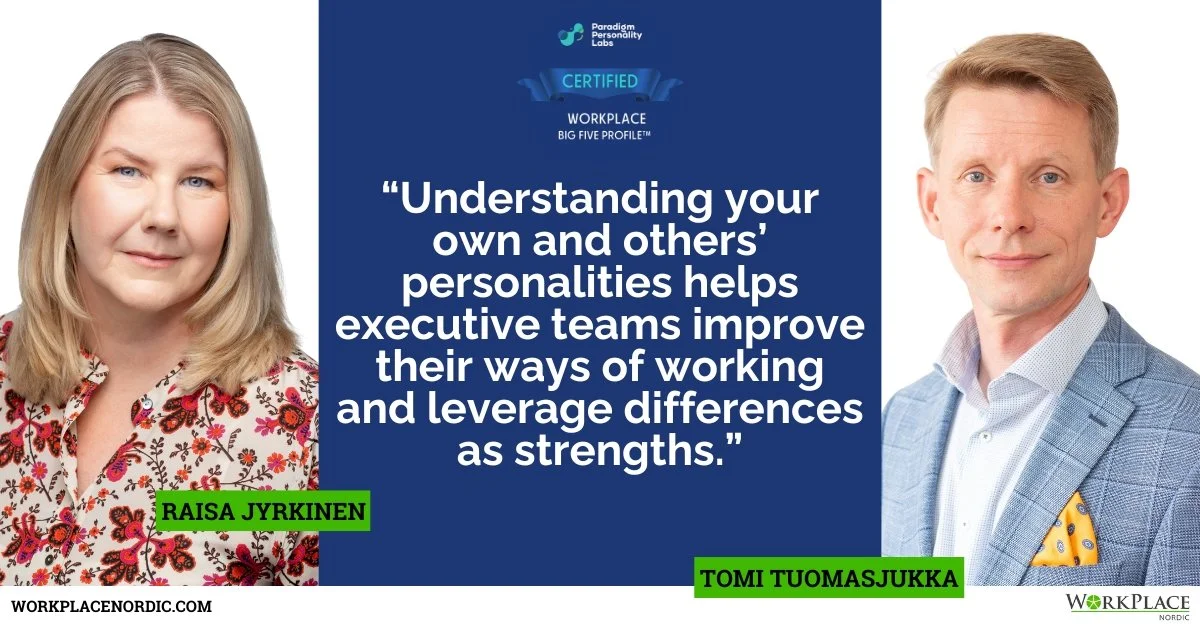How self-knowledge reveals your personal energy drainers
Improving well-being at work starts with understanding what supports or undermines each person’s well-being, says leadership coach and trainer Hedy Kapri. Knowing your personality helps you identify the natural strengths that energize you at work.
“Why does work feel so overwhelming—and so exhausting?”
Workplace well-being and how to improve it are frequent themes in the coaching sessions of leadership coach and trainer Hedy Kapri.
“Some of my clients have experienced burnout and come to coaching to figure out how to move forward. In these situations, improving self-knowledge is key. It’s also essential when developing workplace well-being at the team level”, Kapri says.
To support individuals or teams in increasing self-knowledge, among other things, Kapri often uses the WorkPlace Big Five personality profiling tool.
Powerful insights into your personal strengths
In order to feel better, you first need to understand what makes you feel good or bad, Kapri explains.
“Understanding your personality adds depth to this reflection – a clearer view into who you truly are. WorkPlace Big Five profiling can help identify the reasons why some tasks feel hard or easy”, Kapri says.
For example, if a work role involves constantly challenging others and handling conflicts, but theemployee is naturally harmony-seeking, the work is bound to feel draining.
When work feels like pulling a heavy load day after day, it’s often because you are forced to work continuously against your personality and natural behaviours. You’re constantly pushing yourself, and that takes a lot of energy.
“It’s no wonder that work feels exhausting then. Many of my clients have gained major insights when identifying their natural behaviours and personal strengths. They have described those insights as turning points and empowering,” Kapri says.
Work that gives you energy
Becoming aware of the mismatch between your personality and your current job can at first be difficult to accept. In addition to personality, factors like your personal values and prevailing beliefs about the direction your career “should” take often carry a lot of weight. These very values and beliefs may have guided your career path up until now.
“Personality profiling, followed by reflective conversations, helps people accept themselves more fully. There is no such thing as a good or bad personality – you just need to find the way of working and the environment that fits you best. I believe that everyone can find the right fit, but sometimes it requires an honest and courageous look in the mirror”, Kapri says.
It’s worth the effort because when a person gets to work in line with their own personality and in their areas of strength, the work feels easy and natural.
“You feel good at your job, and your work gives you energy instead of only draining it”, Kapri concludes.
How am I in relation to others?
The same personality trait can be both a strength and a weakness, depending on the environment and on how well a person is able to take that trait into use. For example, in a team full of colleagues who are highly detail-oriented, someone who is less focused on details might come across as completely careless.
But if that same person were to switch to a workplace where more colleagues focus on big- picture thinking, they might actually be the most detail-oriented one in the group.
“It has been incredibly empowering for my clients to see the traits they previously viewed as weaknesses in a more positive light. WorkPlace Big Five is a great tool for highlighting the importance of context and visualizing how your personality shows up in relation to others”, says Kapri.
WorkPlace Big Five supports well-being at work by:
Improving self-knowledge.
Increasing understanding of what kind of work role or tasks are most natural for you.
Encouraging reflection on your personality in relation to others and your work environment.
Pointing the way toward a more sustainable work life in terms of well-being.
Read more about WorkPlace Big Five and add this tool to your professional toolkit.
———
Hedy Kapri is a leadership coach and trainer who uses WorkPlace Big Five in individual coaching, pair coaching, and team development.
Author






